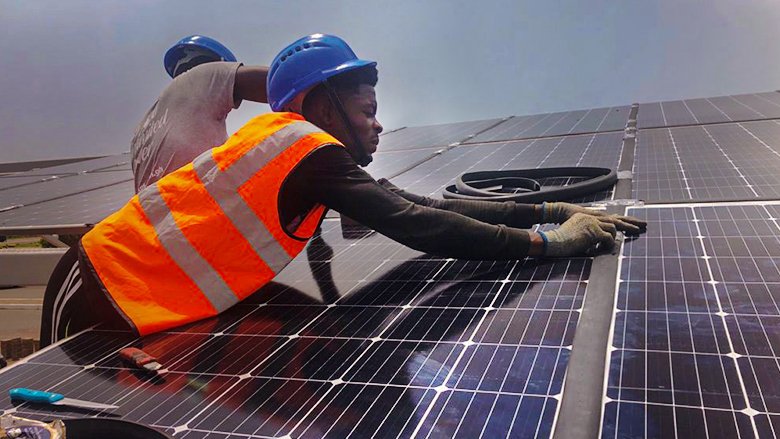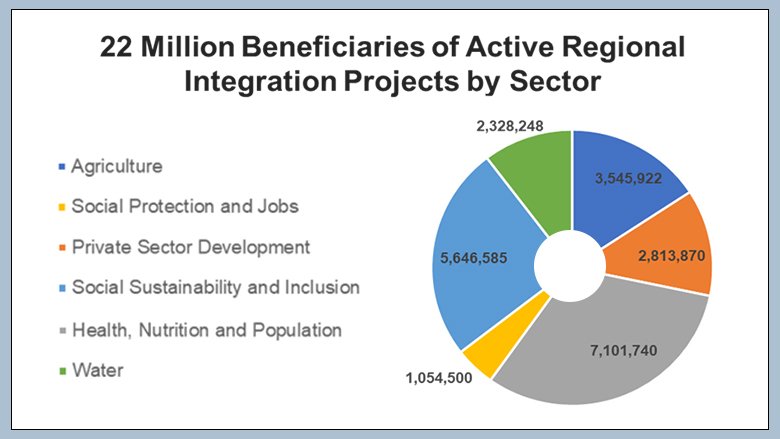RESULTS
Connecting a Continent
The Africa RI Program’s active portfolio supports human capital development with a focus on (i) developing regional systems for disease surveillance and pandemic preparedness; (ii) building continental centers of excellence for higher education; (iii) empowering women through regional solutions that transcend country boundaries; and (iv) helping countries in West Africa develop identification systems to access basic services.
The Africa Centers for Disease Control Support Program to Combat Current and Future Public Health Threats Project is supporting Africa CDC with a $100 million IDA grant for building its capacity to provide on-demand assistance to regional entities and countries in tracking and responding to diseases and pandemics. The project will strengthen the regional capabilities of a robust public health workforce across Africa, including epidemiologists and outbreak responders, and bolster the research, development and manufacturing agendas for vaccines, diagnostics, and therapeutics.
The Regional Disease Surveillance Systems Enhancement (REDISSE) Program, launched in 2016 with IDA financing of $615 million, strengthens national and regional cross-sectoral capacity for collaborative disease surveillance and epidemic preparedness in 15 countries in West and Central Africa, and provides immediate and effective response in the event of an emergency. The program has trained 100 field epidemiologists in surveillance and early detection, set up 107 Centers of Epidemiological Surveillance in 10 ECOWAS countries, built capacity of over 3,000 participants in aspects of epidemic management, supported campaigns for reducing risky behaviors, and mobilized $70 million in funding for outbreak response and $340 million for upgrading health structures and laboratories.
The Sahel Women's Empowerment and Demographic Dividend (SWEDD) Program, launched in 2015 in Benin, Burkina Faso, Chad, Cote d’Ivoire, Mali, Mauritania, and Niger, with $680 million from IDA, enhances the empowerment of women and adolescent girls and their access to quality education and reproductive, child, and maternal health services. It has provided over 100,000 girls and adolescents scholarships to attend school, created 3,500 safe spaces for over 100,000 vulnerable and out-of-school girls, and trained around 100,000 women. Its awareness campaigns on reproductive, maternal, and child healthcare and violence against women have reached over 4 million people. SWEDD has strengthened legal frameworks and institutional capacity on gender policy, budgeting and programming. In addition, 2.6 million people from refugee and host communities have benefited from new infrastructure and services, including immunization programs.
The Africa Higher Education Centers of Excellence (ACE) Program promotes regional specialization among participating universities and strengthens their capacity to deliver quality training and applied research. This flagship regional program, supported by $492 million from IDA, is an African response to African challenges by African scientists who deliver programs and research of international standard. The Program has established over 80 Africa Centers of Excellence (ACEs) in more than 50 universities across 20 countries to produce master’s and doctoral levels specialists in key areas such as STEM, health sciences and agriculture. Over 70,000 students (of whom about 30 percent are women) have enrolled in the ACEs across Africa, more than 100 programs have obtained international accreditation, and institutions have received upgraded equipment and technologies. The program is achieving excellent research results – the West Africa Center on Crop Improvement of Excellence in Sustainable Agriculture & Agribusiness Management (CESAAM), for example, has developed over 180 crop varieties that are more resilient to disease, pests, and climate change.
The East Africa Skills for Transformation and Regional Integration Project is a regional flagship project supported by $293 million from IDA. Its development objective is to increase the access and improve the quality of Technical and Vocational Education and Training (TVET) programs in selected Regional Flagship TVET Institutes to boost regional integration in East Africa. Since its launch, the project has exceeded its results targets of student enrolment in flagship TVET institutes, at 24,172 against a target of 19,475. 367 demand-driven programs have been developed and accredited by national TVET accreditation agencies or certified by industries under the project, against a target of 276.
The Africa RI Program active portfolio supporting enhanced resilience focuses on (i) developing resilient regional food security systems, climate-smart agriculture, and pastoralists’ economy; (ii) enhancing management of transboundary waters to address climate-induced risks; (iii) supporting communities in borderland areas impacted by climate change and conflicts; and (iv) developing the resilience of communities impacted by coastal erosion.
IDA regional support to Food Systems Resilience in West and East Africa stands at $2.1 billion in 13 countries and 7 regional organizations. This is invested in regional food market integration and trade to increase food security, developing mechanisms for resilience of farmers and households most vulnerable to shocks impacting the agriculture sector, enhancing regional research and development as well as regional standards, boosting the `adaption capacity of agriculture system actors, and developing digital services for agriculture and food crisis prevention and management. Immediately after the launch of the Food Systems Resilience program in 2023, 500,000 poor and vulnerable households received cash transfers in West Africa, and 50,000 metric tons of fertilizer were provided to farmers in Togo and Mali.
Enhancing Climate Adaptation through Regional Support for Pastoralists Pastoralist economy in Sahel and Horn of Africa is an important focus of the RI Program. In West Africa, the $467 million IDA-supported Regional Sahel Pastoralism Support Project (PRAPS-2) helps six countries in the Sahel protect pastoral systems by improving resource management and animal health, facilitating access to markets, diversifying sources of income for pastoral households, and managing conflicts. Since its launch, the program has improved the management of more than 5 million hectares of pastureland, and set up 181 water points and 66 cattle markets. It has also supported the economic activity of 20,700 people, 88 percent of whom were women. In the Horn of Africa, the RI Program’s $328 million IDA-supported De-risking, Inclusion, and Value Enhancement of Pastoral Economies in the Horn of Africa (DRIVE) Program directly benefits 250,000 households representing 1.6 million pastoralists and their dependents. It will enable $572 million in private capital to help pastoralists tap into drought insurance and savings, get access to digital accounts, and attract more private investment in pastoral areas. About 2,500 pastoralist groups will be connected to markets to get better value from their livestock-rearing. In the one year since its launch, more than 170,000 pastoralist households have benefited from livestock insurance mechanisms in the region. |
The challenges of borderland communities and their resilience to climate shocks and conflicts are tackled by the RI Program through the IDA-supported regional Development Response to Displacement Impacts Program (DRDIP) in the Horn of Africa, the Lake Chad Region Recovery and Development Project in West Africa, the Community-Based Recovery and Stabilization Project in the Sahel, and the Gulf of Guinea Northern Regions Social Cohesion Project. DRDIP is helping improve access to basic social services, expand economic opportunities and enhance environmental management for host communities impacted by the presence of refugees, with 1.3 million beneficiaries, including 731,000 directly impacted. The program's success triggered follow-up projects to sustain a comprehensive developmental response to refugee impacts to directly benefit the refugee and host communities.
The RI Program is supporting the resilience of communities along coastal areas in West Africa under the $467 million IDA-supported West Africa Coastal Areas Management Program (WACA). The program is targeting coastal erosion, flooding and pollution in nine countries: Benin, Cote d’Ivoire, The Gambia, Ghana, Guinea-Bissau, Mauritania, Sao Tome and Principe, Senegal, and Togo. Since its launch, interventions in the Benin-Togo cross-border coastal area helped make 27,000 households less exposed to coastal erosion and flooding, restored 27,000 ha of habitats in the coastal zone benefitting 4,200 people, 75 percent of whom are women, and created over 4,600 full time jobs. WACA also supports the West African Economic and Monetary Union (WAEMU) in policy harmonization, strategic analytics, coordination among regional institutions, and economies of scale.
The Africa RI Program active portfolio supporting improved regional connectivity focuses on (i) developing regional power pools; (ii) regional digital transformation; and (iii) selective transport corridors to support trade and value chains.
Support for Africa’s digital transformation has helped increase internet usage and broadband speed in landlocked, coastal, and island states. The RI Program supported the AU’s Digital Transformation Strategy for Africa (2020-2030) which aims to build a single digital market in Africa. The Regional Communications Infrastructure Program addressed common challenges across Africa in improving access and affordability of digital connectivity, and improving the service delivery of public and private sectors using digital platforms. Its fourth phase improved the affordability and quality of internet services in Comoros, with 3G network coverage increasing from 60 to 90 percent from 2016 to 2022, while 4G coverage increased from 10 to 65 percent. Internet subscriptions increased from 5,500 to more than 535,000 over 10 years.
The RI Program’s support for selective transport corridors spans large scale transport investments, including corridors in East Africa: Addis-Djibouti, Kenya, Malawi, Cameroon-Chad, Togo-Burkina-Faso-Niger, and Central African Republic-Republic of Congo, with total IDA financing of more than $3.5 billion. These corridors benefit the populations across borders and provide a major stimulus to trade and economic integration. The East Africa Regional Transport, Trade and Development Facilitation Project helped build more than 320 kilometers of roads, with 600 km of new optic fiber and 400 km of rehabilitated optic fiber and construction of 24 strategic social infrastructure utilities to facilitate trade and economic integration. It helped to significantly reduce travel time and costs between Kenya and South Sudan, with journey time between some locations reduced from 48 hours to six hours, and passenger transport costs reduced by 50 percent.
The Africa RI Program’s active portfolio supporting increased trade and market integration focuses on (i) trade facilitation and support to AfCFTA; (ii) regional value chains; (iii) financial markets and inclusion; and (iv) policy and regulatory reforms to support markets.
The Southern African Trade and Transport Facilitation (SATTF) Project is a $330 million IDA-supported multi-country, multi-sector, and multi-phase project that facilitates trade integration between Mozambique, Malawi, and South Africa to address institutional, legal, policy and infrastructure constraints. It supports improved management of public and private resources by promoting a more efficient operation of road and rail transport, enhancing border crossing and sea-ports operations, increasing cooperation between border agencies, harmonizing procedures, and enhancing transparency for border protocols, including customs.
The Financial Sector Development and Regionalization Project, completed in 2020, laid the foundation for financial sector integration among the East African Community states. The project improved financial inclusion and strengthened market participation, unlocking benefits of scale and regionalization with a broad range of financial services and products. It fostered legal and regulatory harmonization in participating countries to achieve a single regional market in financial services. By completion, the project had contributed to quadrupling of bank accounts in participating countries to 110 million.
In Benin, Burkina Faso, Senegal, Côte d'Ivoire, Niger, Mali, Guinea Bissau and Togo, where there is a deficit of about 3.5 million housing units, the RI Program has provided innovative mechanisms for regional risk mutualization and private sector finance leveraging for affordable housing. The project, supported by $130 million from IDA SUW and $25 million from IDA Regional Window, helped expand access to long-term housing finance and mobilize $385 million in private funding through regional and international bond issuances. Under the project, more than 8,700 housing loans have been issued, with 86 percent of beneficiaries receiving their first home loans. In Eastern and Southern Africa, the $425 million is providing new or improved electricity service to 389,822 consumers, including nearly 2 million women, against a project target of 1.5 million; and off-grid energy solutions to 75,358 households, with an overall target of 375,000 by September 2025. The project has created almost 6,000 jobs.



